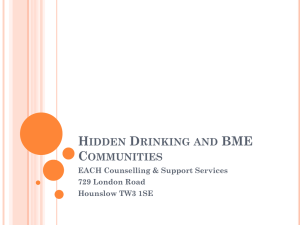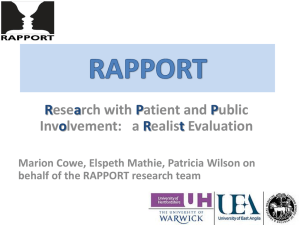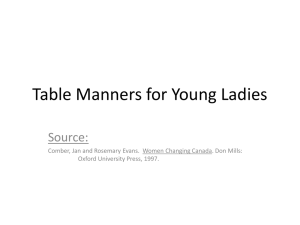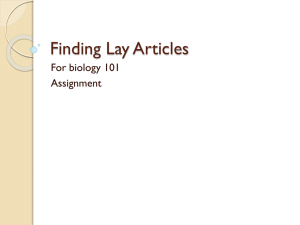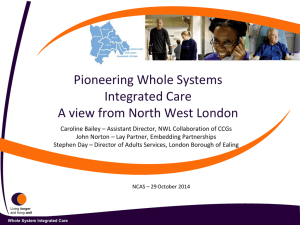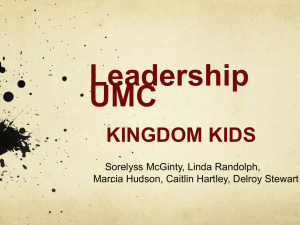Alcohol and the family
advertisement
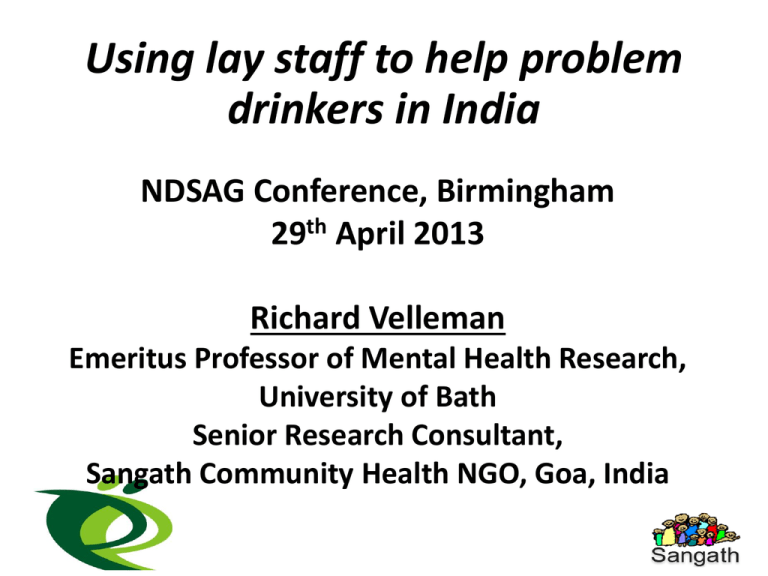
Using lay staff to help problem drinkers in India NDSAG Conference, Birmingham 29th April 2013 Richard Velleman Emeritus Professor of Mental Health Research, University of Bath Senior Research Consultant, Sangath Community Health NGO, Goa, India SETTING 2 SETTING 3 SETTING 4 Lay Staff, Drinkers, India Vikram Patel: world leader in global mental health, leads an NGO in Goa, and Prof. of Global Mental Health at LSHTM http://www.lshtm.ac.uk/aboutus/people/patel.vikram http://www.ted.com/speakers/vikram_patel.html Decided to mount a project looking at both Depression, and Alc Probs in India • Why Alc? Traditionally, low alc country, but now, India is one of the fastest growing alcohol markets in the world and one of the largest consumer of whiskey (which accounts for almost 80 per cent of the entire liquor market in India). [http://www.financialexpress.com/news/liquorconsumption-in-india-to-jump-30-/869641] • High abstention rates, high rates of AUD amongst those who drink, no normative drinking culture, and high rates of alcohol-attributable mortality and prevalence of AUDs, relative to the per capita alcohol consumption The Goan Story • Prevalence of AUD in men- 5-21% • 1/3 who consume alcohol have AUD • Associated with CMD, injuries, economic difficulties & spousal physical violence 6 Lay Staff, Drinkers, India • NOW in India, Alc is second only to depressive disorders as the leading neuropsychiatric cause of disease burden • Remains low on Indian health policy agenda • No services for alcohol (policy = ATUs; reality – very few. Satara – 10+ million catchment area) • Treatment gap amongst the largest for all mental disorders • Lack of trained professionals Lay Staff, Drinkers, India The PREMIUM project (plan!) 5 year project, October 2010September 2015 • Develop an alcohol [& depression] treatment • a) best evidenced using Western research • b) change it to fit with India (Context!) • Get professional practitioners to deliver the intervention, and change and adapt it according to their experiences to make it Indian-appropriate • Once trained and competent, use these practitioners to train lay people to deliver the intervention (s), supervised by a) the trained practitioners and then b) peer supervision • Plan to deliver it in primary care, following screening (AUDIT – scores of 12-19) • Do an RCT (vs ‘enhanced usual care’) 2013-2015, to see if it works. • Focus on Harmful Drinking (AUDIT) not Dependent (20+) Lay Staff, Drinkers, India VERY exciting for me – a) obviously interested in Counselling for Alc Problems; plus b) my work in developing the VACTS scheme in the UK – still running well in Scotland, and c) related to VACTS, in reviewing research on the relative effectiveness of lay and lesser-trained staff vs Highly trained and very expensive staff. SO …. What had been done in PREMIUM in the 14months before I joined, in December 2011 (17 months ago) • Developed the alc [and depression] treatment Lay Staff, Drinkers, India Lay Staff, Drinkers, India • Best evidence seemed to be for Motivational Approaches (Although recognising that CBT and Personalised Feedback might also be useful, alongside of host of other ideas, including utilising social support, religious and spiritual practices, relapse prevention work, etc) • Got Jeff Allison out to run a MI training workshop • Selected 4 professionals to deliver the therapy: 2 x Consultant Psychiatrists, 1 senior psychiatric SW, one trained professional counsellor (came in via Lay work – previous project MANOS delivering to MH services in tandem with primary care in India). • 2 based in Goa, 2 based in Maharashtra (6-8 hour drive or an overnight train away) Lay Staff, Drinkers, India • My role: year 1 (December 2011-November 2012) I was asked to provide weekly supervision to the professionals, and get them to a level that they’d be able to train and supervise the lay workers. Did that December – March in Goa (and Maharashtra) and then weekly by Skype/phone until October • PLUS to co-write an overall generic counselling manual , and also the developing Manual for the Alc treatment – the PREMIUM Approach to Counselling Treatment: Harmful Drinking (PACT-HD); name being changed – probably to CAP - Counselling for Alcohol Problems • PLUS to run a generic counselling course for the professionals – more on that later Lay Staff, Drinkers, India My role: Year 2 (Dec 2012- end of project) • Continue the writing / revising of the manuals; • continue the supervision; • help with the recruitment and the training of the lay workers; • help with developing the RCT. Lay Staff, Drinkers, India Issues and challenges Supervision: Complicated, as they delivered the treatment in local languages (Konkani or Marathi) and I don’t speak either of them (and the two from Maharashtra don’t speak Konkani) Solution: transcribe the sessions; then translate them – ISSUES – awful translations! And lose so much information. Rating of Competence: Develop a systematic way of rating (tried MITS (Motivational Interviewing Target Scheme) and MIA-STEP (Motivational Interviewing Assessment – Supervisory Tools for Enhanced Proficiency). Both measured various aspects (eg Empathy, collaboration, independence, navigation, evocation etc) Lay Staff, Drinkers, India The Psychological Treatment Motivational Interviewing (Behavioural Activation): Indian Professionals found MET Very difficult • Deceptively simple • Very antithetical to India – hierarchical systems • Even trained professionals are not trained - No training in counselling – all from books • MI = mix of core person-centred skills, PLUS structure / direction. COULD do warmth empathy etc; Started by being authoritarian in a warm way; could learn to stop being authoritarian, but then, complete mess and drift, and no structure or control! Found the mix of warmth PLUS structure – collaboration ; independence; all v difficult. Lay Staff, Drinkers, India Solution: I trained all their staff; plus supervised ‘My Four’ with extremely detailed annotations and role-plays to get them to gradually ‘get it’. But Problem: if THEY find it so difficult (1 year of detailed supervision and training) can we expect lay people to get it vastly faster? * Plus, I soon realised that a MI approach would not be enough. Many people needed far more than a motivational nudge. Many people had no drink-refusal skills, felt hugely pressurised, had no alternative social networks, etc etc. Lay Staff, Drinkers, India • Plus the original idea to see only Harmful drinkers and NOT see Dependent ones was deeply flawed – the work is to be done in Primary Care, and we can’t simply refuse to see the most severely problematic of their patients and still retain our credibility with the PC Centres. We have to offer DD something. My idea – offer the same; Jim Mc – offer a brief session plus referral on. Problem – nowhere to refer them on to. Modifications of treatments and in language: • Patient’s participation in agenda setting difficult – They need help to realise that they are ‘allowed’ and wanted to to participate • Use culturally appropriate terms in the Manuals: • Use ‘Counsellor’ instead of therapist; ‘patient’ instead of client’ • Terms such as ‘practice’, ‘exercise’ rather than ‘homework’; • ‘meetings’ instead of ‘sessions’; • Terms such as ‘stress’ and ‘tension’ explain the illness rather than ‘depression’, ‘mental illness’ Current Treatment Manual looks something like this: Lay Staff, Drinkers, India Page 1 2 3 4 5 Understanding Harmful Drinking An Introduction to the PREMIUM Approach to Counselling Treatment for Harmful Drinking (PACT-HD) The style of PACT HD counsellor PACT-HD SESSION BY SESSION GUIDE – A: THE GENERAL FORMAT OF ALL THE SESSIONS: Four Tasks: Developing an engaged relationship; Working together; Helping to set the agenda; and Building the patient’s motivation to change. Structure of each session B: INITIAL PHASE (SESSION ONE – GETTING STARTED) Introduce PACT-HD to our patient Set the agenda Help our patient to better understand his drinking, based on initial AUDIT assessment Give personalized feedback to our patient about his drinking Help our patient to decide on his drinking and other goals Working with our patient on developing a change plan Special Situation: providing a very short version of Session One Lay Staff, Drinkers, India Page 6 7 8 9 10 11 12 C: D: MIDDLE PHASE (SESSION TWO – HELPING THE PATIENT TO CHANGE): Reviewing Progress Problem solving Drink refusal skills Handling urge to drink Handling your difficult emotions ENDING PHASE (SESSIONS THREE AND FOUR – DEALING WITH RELAPSES AND ENDING WELL) Preventing and dealing with relapse Ending well Telephone Counselling and Home Visits Dealing with challenging situations Dealing with patients having Tobacco problem as well as drinking problems Dealing with patients having Depression as well as drinking problems Dealing with Domestic Violence APPENDICES Lay Staff, Drinkers, India The Lay Workers • Recruited and Trained 16 in June 2012. Only 3 left by December. • Recruited and trained new cohort, much more attention paid to engaging them, so far, few dropouts. • We are developing an assessment and competency framework. Piloting the interventions: Engagement: huge problems: Barriers and solutions at patient, facility and interventionist levels Lay Staff, Drinkers, India • PHC Patient refuses screening, does not see screening as a part of the PHC services, does not think it is important • Does not have time for screening – will lose place in the queue to see doctor • Lack of space for screening/privacy • Refuses counselling due to practical barriers • SO does not allow counselling • Patient has no time to wait for first session Solutions: • Spend greater efforts in engagement, recognising that patients comes to PHC seeking medical treatment for physical health problem • Engagement of significant others, family early in counselling – identify support person and develop information materials • Develop optional Short brief session (covering key engagement, and assessment and personalised feedback) Lay Staff, Drinkers, India Opportunities: If ‘works’, will probably be rolled out over whole of India, and maybe much of the developing world: Lay Staff, Drinkers, India
